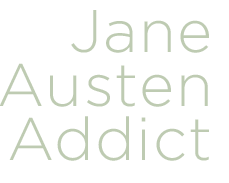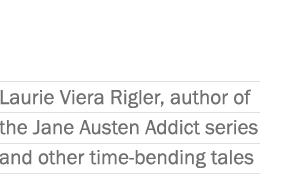Welcome to the first of a multi-part series of posts on how to lift yourself out of the blues, Austen style.
Perhaps it’s just that kind of day. Or year. Bottom line: you feel like crap. Friends, there is a cure to what ails you, and her name is Austen. Her magic comes in many forms, and this series of posts will illuminate, in no particular order, what you can do, with almost no effort, to feel light and bright and fabulous! 
Today we’re feeling the fairy dust from Northanger Abbey.

What? You’ve heard it’s frivolous? Not as polished as Austen’s later works? Balderdash. But wait—didn’t its original publisher accept it and then couldn’t be bothered to publish it? Just means that dude was an idiot. And anyhow, you’re too wise to waste time caring about what other people think. Because if you did care, you wouldn’t be dressing in Regency-era costumes (or wondering what it would be like to do it). You wouldn’t be going to (or imagining) fun things like the Jane Austen Festival in Bath or your local ECD get-togethers (not OCD, ECD, and that stands for English Country Dance). And you definitely wouldn’t be saving up for (or wondering what it would be like to go to) ComicCon. I could do a whole series of posts on the cross-pollination between Austen fans and sci-fi fans, but I digress…
Anyhow, here’s the Northanger Abbey Happiness Program:
1. Read Northanger Abbey.
If you’ve already read it, time to dive in again. Pull out your copy or your app or visit mollands.net, which has all of Austen’s texts. We’ll wait.
[Cue time-lapse photography….]
Congratulations, you’ve turned the last page. Admit it: You’ve got that goofy grin on your face that you have at the end of every Austen novel.
But the fun’s not over yet! Now you get to do a little method acting. Which brings us to:
2. Live Northanger Abbey.
You heard right; you’re going to practice seeing the world as Catherine Morland, the heroine of Northanger Abbey, sees it.
Why? Because Catherine Morland epitomizes the glories of childlike wonder. And childlike wonder is happiness itself. Everything in Bath was fascinating and new to Catherine; she was no jaded tourist, and that was part of her appeal to the hero.
How do you do this? Just take a drive or a walk around your neighborhood or your town/city and pretend you are seeing it for the first time. Try it; it’s fun! Go to those places where you’d take a visitor or a tourist; you know, those places you scoff at because you’re too cool for school or you’re just too busy. Do it. Go there and be a tourist; be someone who finds everything new and wondrous. 
What? You’re saying there’s nothing exciting about where you live? What if I told you that you don’t even have to leave your apartment to find something exciting? All you have to do is imagine that you are Catherine Morland, a young lady from a proto-industrial era, and have never seen an electric light before or a car. Or a tube of mascara. Or a TV. See? Now you’ve got it. You’re experiencing your world like Catherine experienced the city of Bath.
Plus you can always venture into the nearest flower garden and learn to love a hyacinth, just as Catherine did.
3. Binge Northanger Abbey.
Ready for more fun? You get to play or stream the delightful 2007 adaptation of Northanger Abbey* starring J.J. Feild and Felicity Jones. 
Could you possibly feel any better than you do already? You might even try the 1986 adaptation of Northanger Abbey. It’s not the most popular Austen adaptation, but who cares? It’s sweet. Plus, can you really resist a very young Peter Firth (Harry of Spooks/MI-5 fame) playing Henry Tilney and singing duets at the pianoforte? I kid you not. It’s almost as much fun as watching Ewan McGregor in a bad wig singing duets in the Emma film (but we’ll cover Emma in another post).
Feeling better? I sure hope so. Stay tuned for the next part of this series… Till then, may happiness always find you with your door, your mind, and your heart open!!


